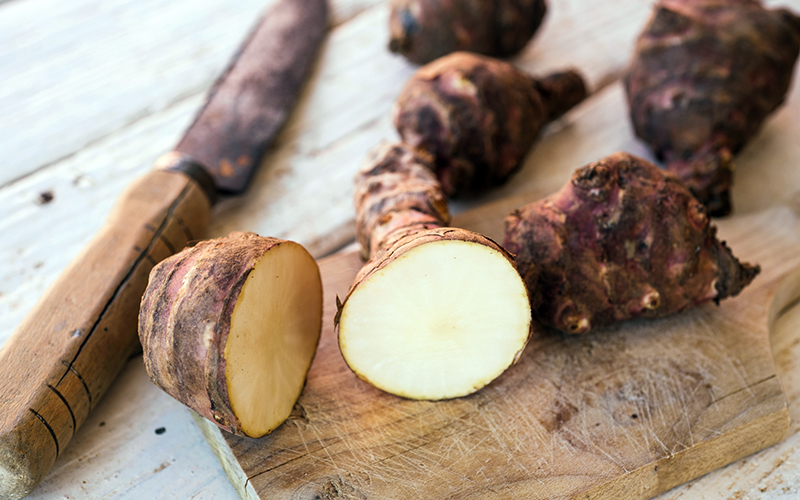
by guest blogger Caroline Praderio, food and nutrition writer for Prevention magazine and EatClean.com
Eating fermented foods high in probiotics like kefir, yogurt, and raw sauerkraut is a huge boon to the trillions of bacteria that run things in your gut. Loading up on probiotics can also improve digestion, and research links healthy bacterial populations to better body weight, mental health, and immunity.
That’s all great news for you gut, but let’s be honest: How many times a week—nay, a month—do you actually eat raw sauerkraut? Yeah, that’s what we thought. And there are only so many cups of Greek yogurt one can spoon per day (we know from experience). So we went on a hunt for a few different foods that still have unique abilities to boost digestive health. Take a break from the yogurt and dig in.
1. Leftover potatoes
Sounds strange, but roasting and then cooling potatoes causes some of their carbs to change structure, making them become indigestible. This special kind of carb, known as resistant starch (RS), passes undigested into the colon, where it just so happens to be a preferred food for gut bacteria. They feed on RS, producing a byproduct called butyrate, a fatty acid that strengthens gut walls and may even stall the growth of tumors in the colon, research shows. Experts recommend around 20 g of RS daily, and just one medium roasted-then-cooled potato provides you with a whopping 33 g.
2. Green bananas
You might want to buy your bananas on the green side: A medium underripe fruit packs an amazing 38 g of RS, which research also shows can help you lose weight and fend off diabetes. Need your ‘nanas to be yellow? Worry not: Ripe fruits still have a respectable 5 g of RS.
3. Sauerkraut juice
All the sauerkraut flavor and probiotics, none of the chewing. This bottled brew, from manufacturer Biotta, is surprisingly tasty for sipping straight or mixed with olive oil for a salad dressing (the flavor is more like vinegar than cabbage). Just be wary of the sodium content: One cup has 960 mg, which is almost half the current recommended daily allowance.
4. Collagen
It’s not just the stuff inside your skin—you can actually buy powdered collagen, made from cow and fish connective tissue, and add the stuff to food. In fact, proponents claim the trendy new supplement can help soothe achy joints, reduce the appearance of wrinkles, and improve gut health. While there’s no research linking collagen to better gut health, experts say that its high amino acid content could prevent intestinal permeability, also known as leaky gut, a condition that can cause inflammation throughout the body. Want to try it? The tasteless powder blends well in smoothies, coffee, and even plain water. Intrigued? Here are more things that happen when you eat collagen every day.
5. Jerusalem artichokes
First of all, forget the name of this strange piece of produce: It’s got nothing to do with either artichokes or Jerusalem. It’s a root, actually, and it’s native to the US. It’s also one the world’s best sources of prebiotics—a class of indigestible fibers that feed good gut bacteria, allowing them to flourish. (PS: Jerusalem artichokes are also a good source of vegetarian iron.) Cook them like potatoes, add to stir-fries or salads, or whip them into your usual hummus recipe.
6. Dandelion greens
Dandelion greens are popping up at more and more grocery stores, farmers’ markets, and restaurants as a trendy new salad green (they’ve got a bitter taste similar to arugula). Aside from their unreal nutrition stats (more calcium, vitamin K, and vitamin A than both kale and spinach!), the greens also pack tons of prebiotics to keep your gut bugs happily fed.
 Caroline Praderio is the food and nutrition writer for Prevention magazine and EatClean.com. A native of Massachusetts, she’s a graduate of Emerson College and a winner of two International Regional Magazine Association awards. When she’s not writing, she loves to read, cook, and rehearse with her dance company.
Caroline Praderio is the food and nutrition writer for Prevention magazine and EatClean.com. A native of Massachusetts, she’s a graduate of Emerson College and a winner of two International Regional Magazine Association awards. When she’s not writing, she loves to read, cook, and rehearse with her dance company.
Adapted from a story originally published on EatClean.com.




No comments yet.